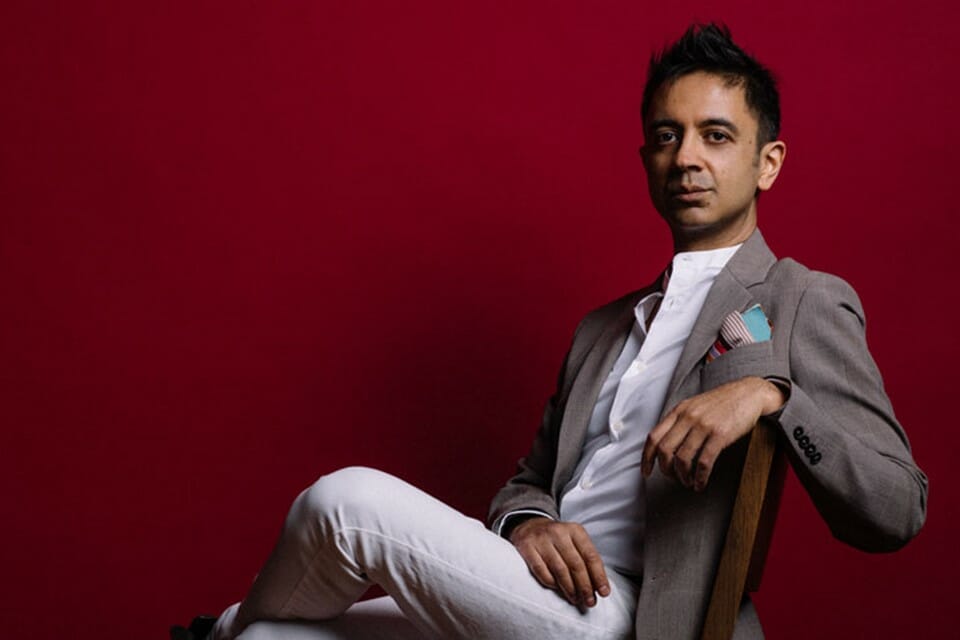Swing Time: Vijay Iyer

photo credit: Ebru Yildez
***
Prolific is just one of many adjectives that seem to attach themselves to Vijay Iyer’s name—along with visionary and virtuosic—nearly every time a writer profiles the pianist and composer. It’s been more than a year since the release of Iyer’s most recent album, Uneasy (ECM Records)—recorded with bassist Linda May Han Oh and drummer Tyshawn Sorey—and, in that time, Iyer has committed to several new projects, including a concerto with Israeli cellist Inbal Segev and a collaborative work with Pakistani vocalist Arooj Aftab titled Love in Exile. Iyer has continued to maintain a busy performance schedule, with a run at New York’s Village Vanguard and a European tour already behind him this year.
He is also currently writing new music for the Oh-Sorey trio, and incorporating it into their concerts. As of press time, they were scheduled to head back into the studio in May to record it. “The trio music has been evolving,” Iyer says during a Zoom chat, calling from Italy during a spring tour with other musicians. For him, such a constant whirlwind of creativity is the norm. “I just turned 50 a few months ago and I’ve been doing this for a while,” he says. “So it’s not that I’m always doing a lot; it’s just that, little by little, things accumulate.”
Still, “a lot” is something of an understatement. The Albany, N.Y.-born Iyer says that Uneasy is his 17th studio album as a leader or co-leader in a quarter-century, although his Wikipedia page shows 25 in all—including solo, duet, trio and sextet recordings, as well as featured guest spots with a number of jazz luminaries. Iyer’s work has earned him a slew of awards and grants, among them a MacArthur Fellowship, a Doris Duke Performing Artist Award and a shelf’s worth of Artist of the Year honors from various jazz publications.
And did we mention that he is also a respected educator, cross-appointed to both the Department of Music and the Department of African and African American Studies at Harvard, where he founded a Ph.D. program called Creative Practice and Critical Inquiry?
Even with all of that bustle, Iyer remains eager to talk about Uneasy, one of the most glowingly received recordings of his career. This publication, in its review, said about the album, whose contents can be viewed through a political lens that may seem more fraught than ever today: “It doesn’t so much augur an end-times dread as serve to bolster a sense of confidence in our ability to rebound. While there is often a resolute aggression to the performances, an implied threat of tension and discomfort, a manifest beauty is never far away.”
Despite the timeliness of the sentiment fueling Uneasy, its title track was composed in 2011, before Trump’s presidency and a decade after 9/11. Another key track, “Combat Breathing,” was created in 2014, following the choking death of Eric Garner, a Black man, by New York City police officers.
“A lot has been made of the politics of this record, and maybe it puts it out there with the album title and the album cover,” Iyer says. “But I don’t think that this album is more political than some other records that I’ve made. It’s just the way that it hit, at the moment that it hit. It came out when the vaccines came out. The pandemic was more than uneasy. We were living in the midst of suffering and great inhumanity—these staggering mass deaths, this mass indifference to these mass deaths. So what do you do in the face of that? But also, maybe it’s a reminder that a sense of unease has been [present] throughout the 21st century.
“Time is such a blur now,” he adds. “My whole sense of chronology has been altered by what we’ve been through in the last two years.”
Uneasy, Iyer continues, is a collection of earlier compositions, newer writings and a pair of covers, one of which, Cole Porter’s “Night and Day,” was actually composed in 1932. How does that interpretation fit the album’s theme? “I first encountered the song on [saxophonist] Joe Henderson’s record Inner Urge,” Iyer says. “He basically bent the song to his will—changed the shape of the harmonies, the overall layout of it. For me, it’s about that way of intervening on the repertoire, not just celebrating Cole Porter. It’s turning it into something quite different, kind of a hot rod that you could drive a very different way. It just becomes a showcase for us as players and performers.”
When it comes to those players, Iyer can’t stop lavishing praise. He and drummer Sorey go back some two decades— the two first worked in a trio with Oh in 2014. The music that became Uneasy, Iyer says, “all started with the idea of bringing out this trio’s strengths, to let them shine and give us something to rise to. We made the album in 2019— an intense, tumultuous time in history—and I asked, ‘What does it mean for the three of us to say ‘we?’ What was it that we could express together? That’s a challenge you have to rise to. And then there are other moments that are much more lyrical and gentle, exploring the quiet and the emotional. I think it’s that balance that I was reaching for in programming this material. I’m very wary of any music that calls itself political, and I don’t really do too much work to insist that my music be called or be heard as political. But I think that, being the people that we are, everything we do is political; we don’t need to force the issue. What does it mean for me to play with Tyshawn, to build a familial relationship between him, and then us with Linda? For us, just showing up is political.”



















